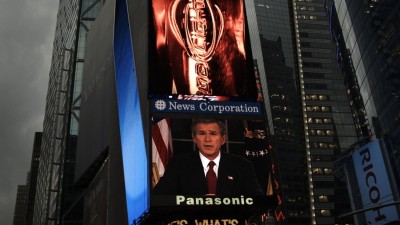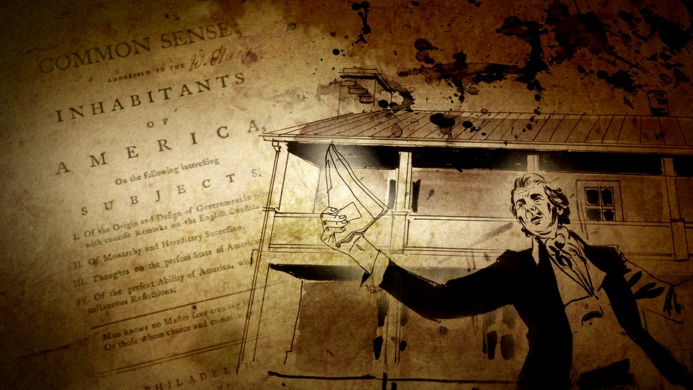“Shadows of Liberty” — a film review by Gary Chew
“When men yield up the exclusive privilege of thinking, the last shadows of liberty quit the horizon.”
That rhetorical flourish in 1776 from the pen of Thomas Paine, it could be argued, is what precipitates — yet to this day — the conflict surveyed in a new documentary about what the film outlines as long term effects of media conglomerates on a free society.
In his day, Paine was a pain for many. But for journalism and democracy, he might have been the one to kick start the idea of letting a majority of people find the best way into the future for a nation.
A contemporary sound bite in an interview with David Simon, creator of the police-procedural cable series, “The Wire,” has this to say in “Shadows of Liberty” … “Capitalism is not the best judge of what’s best for a society.”
 “Shadows of Liberty” is by French-Canadian, Jean-Philippe Tremblay. It bears the style of other documentaries that address what might be called fissures in American democracy. The pace, a latent sense of dread, the music and the almost voyeuristic distance the camera keeps watch are well-crafted to make Tremblay’s point. Moreover, the film has a sequence of animation that shows true artistry. Tremblay’s piece breathes, not rushing from one sequence to the next. It’s like the director allows time for the material to soak in. The documentary isn’t too long, running slightly over ninety minutes.
“Shadows of Liberty” is by French-Canadian, Jean-Philippe Tremblay. It bears the style of other documentaries that address what might be called fissures in American democracy. The pace, a latent sense of dread, the music and the almost voyeuristic distance the camera keeps watch are well-crafted to make Tremblay’s point. Moreover, the film has a sequence of animation that shows true artistry. Tremblay’s piece breathes, not rushing from one sequence to the next. It’s like the director allows time for the material to soak in. The documentary isn’t too long, running slightly over ninety minutes.
Significant U.S. news stories that have been allegedly “altered” or spiked get the film rolling. Roberta Baskins’ 1996 CBS News report of Nike’s labor practices involving the corporation’s Vietnamese employees sets up the string that also includes the 1996 crash of TWA Flight 800 into the Atlantic Ocean off New York City and Kristina Borjesson’s experience attempting to report that awful event — first for CBS, then ABC.
A closer-to-home story of considerable magnitude was of the death of the late, investigative, Pulitzer prize-winning journalist, Gary Webb, and his controversial series for the San Jose Mercury-News called “Dark Alliance,” made available once again, on the internet. The sequence of articles reported a crack cocaine connection in Central America dumped the illegal substance in the Los Angeles area and other large U.S. cities with profits for its sale then being funneled back to support the CIA-backed Nicaraguan Contras under the Reagan Administration.
Webb’s death in Carmichael, California was ruled a suicide with a coroner’s report indicating that Webb died of two self-inflicted gun shots wounds to the head. Tremblay’s film doesn’t mention this final facet of the death.
 This is pretty hot-stuff cinema, and stays that way by continuing with more information that puts the small number of influential U.S. telecommunications conglomerates in not the best light.
This is pretty hot-stuff cinema, and stays that way by continuing with more information that puts the small number of influential U.S. telecommunications conglomerates in not the best light.
Familiar faces in “Shadows of Liberty” show up with much to say. This list gives one an idea of what most of the personalities declare regarding their association with media, journalism, government and politics. Baskins and Borjesson along with Dan Rather, Daniel Ellsberg, Julian Assange, Chris Hedges, Amy Goodman and Robert McChesney offer their viewpoints. Video clips of others taking differing positions include Rupert Murdock and former CEOs of NBC and General Electric.
“Shadows of Liberty” recently aired on KCET in Los Angeles, and was also freely streamed from LinkTV.org for several days in early April. That’s how I was able see it.
Current Internet issues come at the close of the film, and echo back to legislation affecting U.S. radio frequencies that came from the Communications Act of 1934.
Since the thrust of Tremblay’s documentary is that much important news goes unreported in the United States due to corporate influence, one could safely assume the documentary won’t show in any large cineplex, small theater or on commercial cable or broadcast television.
Sometime in the near future, what are the chances the flow of information on the Internet will undergo a similar procedural process to make it increasingly easier for only a few to manipulate?
The quote from Thomas Paine and the more contemporary words on capitalism spoken by David Simon are countered at the close of “Shadows of Liberty” by a son of Rupert Murdock. Speaking before a large audience, James Murdock says … “There is an inescapable conclusion, if we are to have a better society. The only reliable, durable and perpetual independence is profit.”
Intellectually navigating the chasm between these opposing philosophies can keep a moviegoer well occupied — from whichever side of the aisle he or she sits in a theater that, most likely, won’t any time soon be showing this well-made and provocative documentary.
The movie is currently streaming free in the U.S. here.
- Movie Review: ‘The Glorias’ - September 28, 2020
- Movie Review: ‘I’m Thinking of Ending Things’ - September 10, 2020
- Movie Review: ‘The Burnt Orange Heresy’ - August 31, 2020


